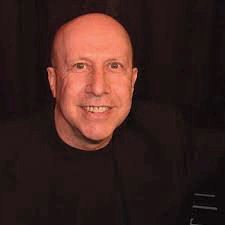

Composer tributes are a staple of cabaret shows, but in most cases the composer him- or herself is either deceased or otherwise unavailable to take part in such ventures. In his recent outing at 54 Below, directed by Sara Louise Lazarus, Alex Rybeck proved to be an exception. Not only did he write the music for all 18 "songs that nobody's ever heard of," as he self-deprecatingly described the evening's bill of fare (twice), he quite clearly orchestrated the whole thing, in two senses of the word. As pianist and musical director he sat left of center stage, playing the piano and overseeing a splendid backup band: Dan Gross on drums, Sean Harkness on guitar, and Dick Sarpola on bass. Rybeck also narrated the introductions of the collection of 16 top-shelf cabaret singers who appeared in his behalf (some of them flying in from afar for the occasion), the songs they were singing in his honor, tales of his 35-plus years in the music business, and the back stories of how he had come to collaborate with his many lyricists. The show, a semi-reprise of one Rybeck had held at the same venue back in November, "with some songs the same, some different," was clearly a love-fest among the guest artists and the composer, not to leave out the full, enthusiastic audience, which included a couple of his featured lyricists.
As befits a gathering of old friends, the tone of the evening was casual, with most men on stage not wearing ties, and the women mostly wearing pants. Inherently and forgivingly under-rehearsed, considering the ad hoc nature of the proceedings, many of the singers relied on sheet music; Ann Hampton Callaway read hers off a tablet. As at all successful smorgasbords, the order of sampling the goods here was not predictable, with songs flowing naturally from one to the other. There was simply this song, and then that song—and why not? The only through-line necessary was the mutual affection and respect among the composer and his chosen performers.
With such an array of talent, most singers got to perform only one song, with some participating in a second number, a duet, or as backup singers. And while nobody stumbled or seemed wrong for the song he or she sang, there were a few standouts. Joyce Breach brought the house down with "Strictly for Laughs" (lyrics by Ira Gasman). Many of the more memorable selections were comedic, such as "Glitter and Be Gray," a midlife riff on "Glitter and Be Gay" from Candide, giving Leonard Bernstein co-composer credit, in a memorably hilarious rendition by Maureen Brennan. Jason Graae, somewhat in Paul Lynde mode, killed with his delivery of "Sybil, Why Did You Have to Split?"—a highly amusing paean to the most famous split personality of them all. This song has lyrics co-written by Seth Friedman and Rybeck, his only lyric contribution to the proceedings. But funniest of all was "A Letter to Mom (AKA Character Gal)," about a second banana who always gets work but will never be a leading lady--with lyrics by Scott Hayes and a socko rendition by Mary Stout.
On the slower side of things, "The Lilac Song" (Milan Stitt), sung by Ann Hampton Callaway, and "Hold to My Hand (And Take Me Along)" (Carol Hall), sung by Kevin Dozier, stood out, as did the irrepressible Karen Mason's 11 o'clock number, "I'll Burn that Bridge When I Get to It" (Seth Friedman). None of which is to take away anything from the other vocal participants: Liz Callaway, Joshua Dixon, Jamie Hartman, Sally Mayes, Tony Middleton, Marcus Simeone, Avery Sommers, Susan Winter, and Jeffrey M. Wright.
In the event of a future similar event, which there probably should be, and probably will be, Rybeck might want to refine his chat a bit. Twice, after knockout performances and ecstatic ovations for them, he dredged up the early 1990s cliché (which was annoying even back then): "Not too shabby." He meant this as high praise but there had to have been a better way to express it. How he met and worked with each lyricist is not always as interesting as his collaboration with Carol Hall, where he played a melody for her on the telephone, before they had even met, and within 48 hours she'd delivered a finished set pf lyrics. But Rybeck seemed determined to give all of his collaborators equal back-story time, so there was too much of "so-and-so called me and said I should get together with so-and-so" talk. On the other hand, I'd like to have heard more about his assertion that his melodies are written first about half the time, in search of lyrics, and that the other half of the time, the words are delivered to him first. This seems a bit unusual for a composer, and it would be interesting to find out even more about how and why he does things that way. I'd also like to know more about why Rybeck doesn't write many lyrics himself.
But all in all, to not coin a phrase, this show was "not too shabby."
More Music by Alex Rybeck
54 Below – May 21